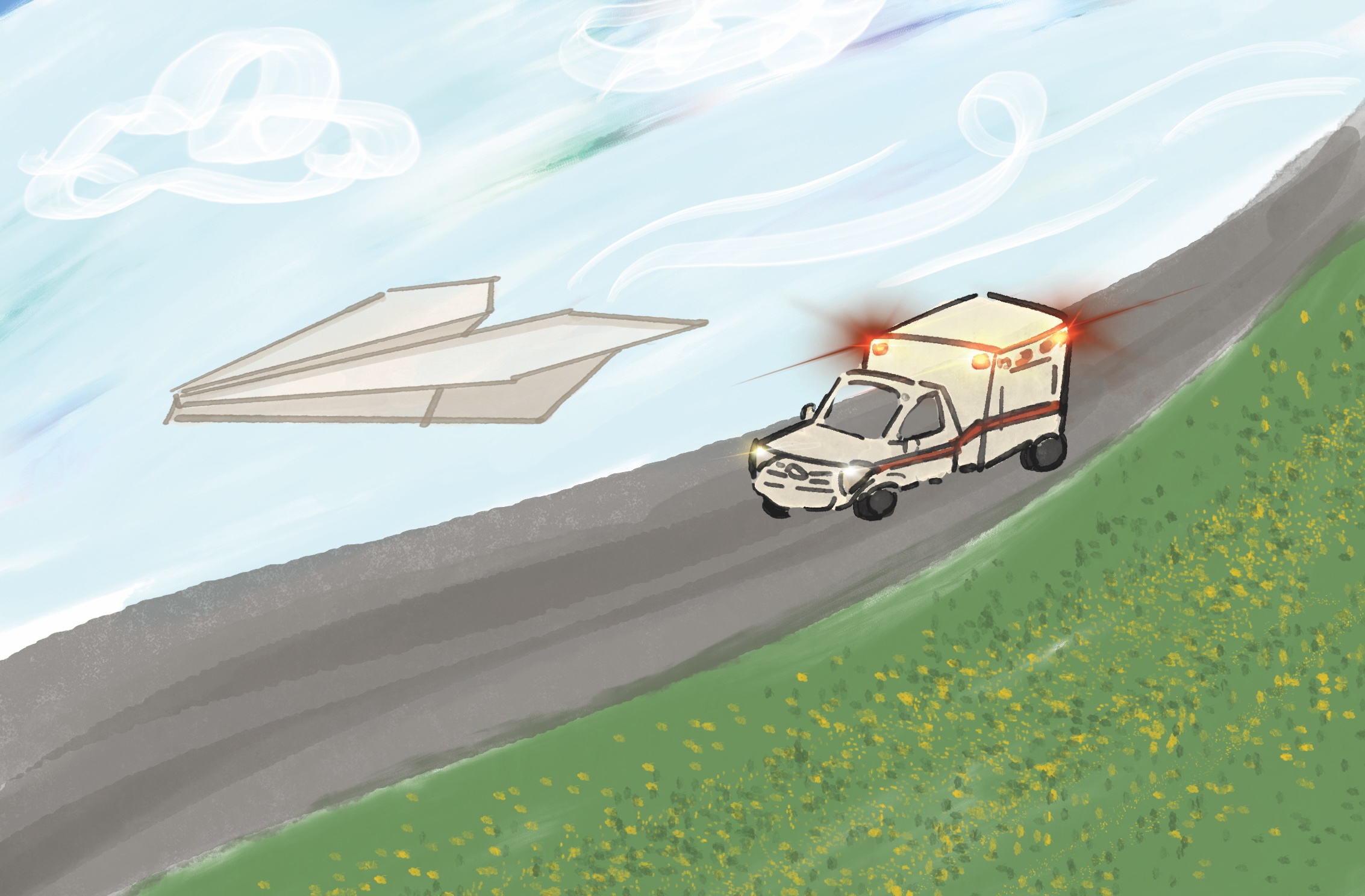911: Are you ready for an emergency?
May 2, 2025
 Si Ting Chen
Si Ting ChenWhen the alarm finally rang, I didn’t expect it to be a car crash. I’d been a volunteer Emergency Medical Technician (EMT) at Harpswell Neck Fire Department for five months, more than a full semester, and had not yet received a single call. Every shift I’d wander in, set up a little desk on the table on the first floor with a view of the house across the road and talk with the other EMT on duty before packing up and returning to campus by 7 p.m.—until the day I didn’t.
I’m a planner. When college starts to overwhelm me, I open my planner and plan out by the hour. I’ll carefully designate everything a time, from when I’ll call my mom to ask about her day to the moment I’ll pick out my outfit for tomorrow. Writing it all down, seeing for myself that there are going to be enough hours in the day to get everything I want done, always eased my stress.
Perhaps this isn’t a surprise, but my mindset didn’t exactly jibe with being an EMT. During my first shift, I sat around for longer than I’d like to admit, trying to decide what to do. Was there any point in starting to write my French report if the walkie-talkie next to my notebook could go off at any minute?
All of a sudden, I had several hours that I could not assign a task to. With nothing to do, I worried. I restocked the ambulance, I reviewed run reports and I rechecked that my walkie-talkie was on, waiting for a call and worrying about what I would do when that call finally came. With each shift I would practically pray that an emergency wouldn’t happen because, as each shift passed and I didn’t get a call, I grew less and less confident that I’d be ready when one actually came.
But as the weeks ran into months and the walkie-talkie never rang, I stopped expecting a call. My phone is connected to dispatch, so throughout the week, I get notified whenever an emergency comes in. Well, I’d been keeping a pretty close eye on those notifications. Most of the calls came in from an older person who had an accidental fall or someone suffering from cold or flu-like symptoms. As I read through the dispatcher’s reports, I could picture myself responding to each one. But, either way, I was increasingly confident my four-hour weekly shift was not going to be the time these rare calls came in. I started assigning tasks to those hours I was at the station, and I left each week with those tasks done.
Until the walkie-talkie rang and a three note, high-pitched tone sounded out. Even then, I still didn’t really recognize it as a call—after all I’d never heard the station’s tone before—until a clear voice broke through saying “Harpswell Neck Rescue 7, stand by for an emergency.”
I didn’t stand by. I wasn’t really sure what to do—I knew we still had to wait at the station for the ambulance driver to arrive, but I couldn’t sit still. I paced, checking I had everything I needed in my pockets and making sure my shoes were tied. I didn’t sit down until I was in the back of the ambulance, my neck craned so I could see through the small crack into the driver’s compartment that allowed me to watch the ambulance speed down the two-lane road, wondering where we’d pull to the side and find the lady who totaled her car. As we sped down the ice and snow-covered road, the same road—I remember worrying—that I’d soon have to drive back to campus on, I nervously reviewed necessary C-spine precautions and the signs of head injuries.
The patient was fine, although her car was not, and I felt pretty confident I’d received the one and only call I’d get all year. Until I pulled up to the station for my next shift and had to run to meet the ambulance leaving the bay. The following week after that second call, I didn’t even have time to roll my car window up before joining the crew leaving to respond to a possible stroke.
The fourth week after my first call went more like I was used to. Not a peep from the walkie-talkie. I put my backpack in the passenger seat of the car, turned the seat heater on and reversed out of my parking spot when a call came in just a minute after my shift ended—6:01 p.m. It wasn’t mine to respond to, and I drove right back to campus.
But I thought the whole drive home, “What if that had come in just a minute sooner?” I’d still be on the same road but speeding and unlikely to get back to campus anytime before 9:00 p.m. that night. Although simple, that moment, after the three weeks of back-to-back calls, changed my perspective. On or off call, I can’t write my hourly schedules anymore because I finally realize I have no more control over the next hour than I do over when the next call comes in. I’ve also let go of the worry of what I’ll do when the next call finally comes.
Ava Moore is a member of the Class of 2027.
Comments
Before submitting a comment, please review our comment policy. Some key points from the policy:
- No hate speech, profanity, disrespectful or threatening comments.
- No personal attacks on reporters.
- Comments must be under 200 words.
- You are strongly encouraged to use a real name or identifier ("Class of '92").
- Any comments made with an email address that does not belong to you will get removed.

What a relatable and well-written article!